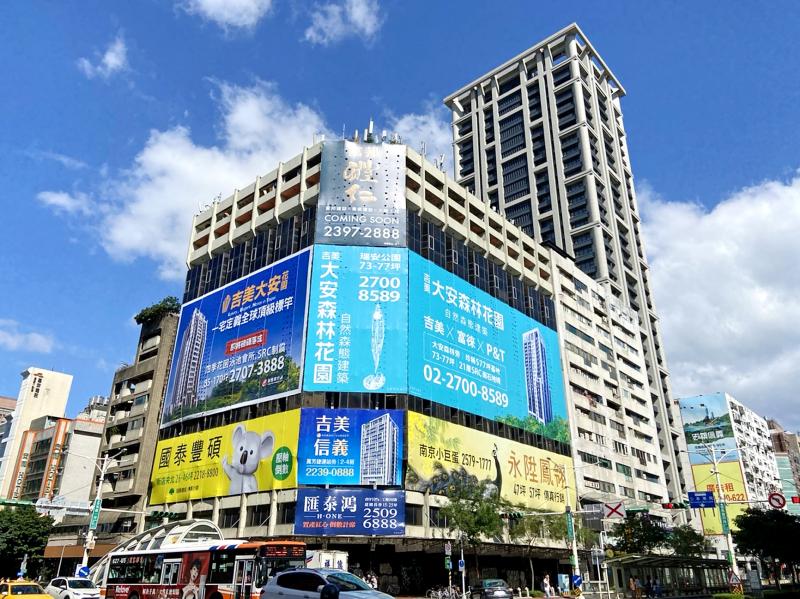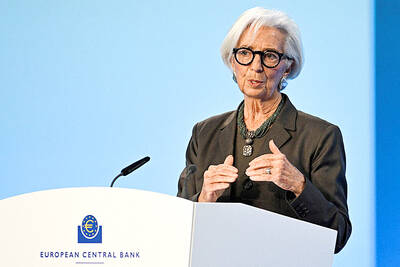Presale housing project prices gained modestly across northern Taiwan last quarter due to higher construction costs, with healthy demand and low interest rates also lending support, the Chinese-language Housing Monthly (住展雜誌) reported yesterday.
Presale housing projects, for which noticeable price hikes last year prompted the government to tighten credit controls and step up lending inspections, saw prices climb, even in the less popular counties of Yilan and Keelung, the report showed.
“The price hikes are likely to continue this year, despite the latest wave of selective credit controls that slow, but do not stop, the pace of the increase,” said Ho Shih-chang (何世昌), the magazine’s research manager.

Photo: Hsu Yi-ping, Taipei Times
The price upturn would be steeper if it was not for the credit controls that cap the loan-to-value ratios at 55 to 65 percent for corporate and multiple home owners as well as for unsold houses and land financing, Ho said.
In Taoyuan, presale housing prices gained 2.5 percent from a quarter earlier to NT$244,000 per ping (3.3m2), with gains most evident in properties near Taoyuan International Airport and the high-speed rail station, Ho said, adding that presale housing prices rose 8.4 percent from a year earlier.
Prices in Yilan emerged from years of corrections to grow 3.9 percent quarterly and 2.9 percent annually to NT$213,000, Ho said.
While Yilan is popular among tourists, it is less attractive for housing investment due to long travel times to Taipei, Ho said.
The government’s plan to extend the high-speed railway system to Yilan has reversed that trend, he said.
Presale housing prices in Keelung saw a 2.4 percent increase quarterly and yearly to a record of NT$216,000 per ping, spurred by upscale housing projects, Ho said.
In Hsinchu, the most notorious area for sales increases, prices edged up 0.9 percent quarter-on-quarter and 3.1 percent annually to NT$232,000, Ho said.
Developers and builders have slightly slowed activity, but their conservative approach could fuel price hikes due to lower supply amid sturdy demand, he said.
In Taipei, presale housing prices increased 1.1 percent quarter-on-quarter to NT$886,000 per ping, or 4.5 percent annually, he said.
Housing prices in New Taipei City rose 1 percent to NT$407,000 per ping, or 3.8 percent annually, Ho said.
The prospect of rezoning has bolstered the market in New Taipei City’s Banciao (板橋), Sindian (新店) and Sinjhuang (新莊) districts, he said.
Ho suggested potential buyers with real demand to take action, as the chance for price corrections is slim in the next few years.

European Central Bank (ECB) President Christine Lagarde is expected to step down from her role before her eight-year term ends in October next year, the Financial Times reported. Lagarde wants to leave before the French presidential election in April next year, which would allow French President Emmanuel Macron and German Chancellor Friedrich Merz to find her replacement together, the report said, citing an unidentified person familiar with her thoughts on the matter. It is not clear yet when she might exit, the report said. “President Lagarde is totally focused on her mission and has not taken any decision regarding the end of

French President Emmanuel Macron told a global artificial intelligence (AI) summit in India yesterday he was determined to ensure safe oversight of the fast-evolving technology. The EU has led the way for global regulation with its Artificial Intelligence Act, which was adopted in 2024 and is coming into force in phases. “We are determined to continue to shape the rules of the game... with our allies such as India,” Macron said in New Delhi. “Europe is not blindly focused on regulation — Europe is a space for innovation and investment, but it is a safe space.” The AI Impact Summit is the fourth

CONFUSION: Taiwan, Japan and other big exporters are cautiously monitoring the situation, while analysts said more Trump responses ate likely after his loss in court US trading partners in Asia started weighing fresh uncertainties yesterday after President Donald Trump vowed to impose a new tariff on imports, hours after the Supreme Court struck down many of the sweeping levies he used to launch a global trade war. The court’s ruling invalidated a number of tariffs that the Trump administration had imposed on Asian export powerhouses from China and South Korea to Japan and Taiwan, the world’s largest chip maker and a key player in tech supply chains. Within hours, Trump said he would impose a new 10 percent duty on US imports from all countries starting on

STRATEGIC ALLIANCE: The initiative is aimed at protecting semiconductor supply chain resilience to reduce dependence on China-dominated manufacturing hubs India yesterday joined a US-led initiative to strengthen technology cooperation among strategic allies in a move that underscores the nations’ warming ties after a brief strain over New Delhi’s unabated purchase of discounted Russian oil. The decision aligns India closely with Washington’s efforts to build secure supply chains for semiconductors, advanced manufacturing and critical technologies at a time when geopolitical competition with China is intensifying. It also signals a reset in relations following friction over energy trade and tariffs. Nations that have joined the Pax Silica framework include Japan, South Korea, the UK and Israel. “Pax Silica will be a group of nations